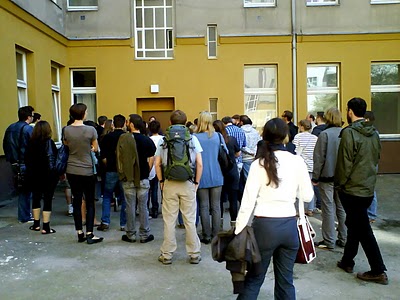This stretch of Urbanstraße is clogged with four lanes of traffic and is not far from the discordant medley of department stores, down-at-heel snack shops, and McDonalds that is Hermannplatz. And yet, outside a building on this busy street in Kreuzberg, considered undesirable only a couple years ago, are crowds of hipsters jostling for their shot to rent an apartment.
The price is right: €350 + utilities apartment, 80 square metres. The Berlin dream! You can live here more cheaply than in almost any other European capital. But let’s be honest, the logistics actually to obtain such an apartment are increasingly difficult to manage.
House-hunting in Kreuzberg used to be very different. Only a couple years ago you might be alone with the estate agent. He made light of the view to a wall (provides necessary shadow in the summer!) or the first-floor exposure to traffic (you really feel like you are part of the community!).
Nowadays, that same agent peers down at the prospective tenant in judgement, and insists haughtily on the dossier of supporting documents: bank statements, letters from your current renter, a credit check. Beware if you are foreigner or a freelancer or deviate in any way from being a angestellt white German. The agent might well shake his head, sehr schlecht, sehr schlecht! and turn to one of the other of 45 punters vying for the same 900 square-foot space.
That’s how many I counted as we waited for the man with the keys, this Sunday in April.
Most apartments of this size in Kreuzberg will go these days for €700 plus + utilities, which is still cheap by European standards. And they too will have large groups competing, especially if the property has been advertised on immobilienscout.de, the most popular German property search engine. Most properties that have balconies, southern exposures, and quiet, are difficult to find on the site, as they have already been swooped up through networks of friends and directly from the property managers. Immobilienscout provides the leftovers, and there are hordes of the hungry willing to chase after the crumbs, especially if the property is in Kreuzberg.
Some of the prospectives are refugees from Mitte, looking to live in a neighbourhood that has not yet been given over to tourism. Kreuzberg has the beauty of the canal, old trees and sunbathers, corner cafés, Turkish markets, good bakeries and restaurants that were established well before the Wende. It is undoubtedly a very beautiful place to live, but not the only one.
Kreuzberg has recently developed the reputation for being the new right place to live. I have never fully understood the fierceness with which aficionados of Berlin neighbourhoods defend their turf. Perhaps because the city is vast, eight times the size of Paris entre les murs, with only slightly more people, there is a necessity to make sense of the whole by denigrating perfectly nice neighbourhoods (‘Prenzlauer Berg is full of yuppy scum’, ‘Friedrichshain never delivered’, ‘Schöneberg is boring’) and exhaulting Kreuzberg as the real Berlin. It means that even parts of Kreuzberg, located near the action but which aren’t desirable in their own right, become hotly sought after when similarly located spots in Treptow or Tempelhof are left quite alone.
And so the crowds on Urbanstraße compete in the fashion show. Push your way through the door to the courtyard, that smells of frying food, and then up the smoky stairs with dozens of desperate hipsters. See someone palm €50 to the property agent, and ask yourself whether your dignity knows neighbourhood boundaries.

